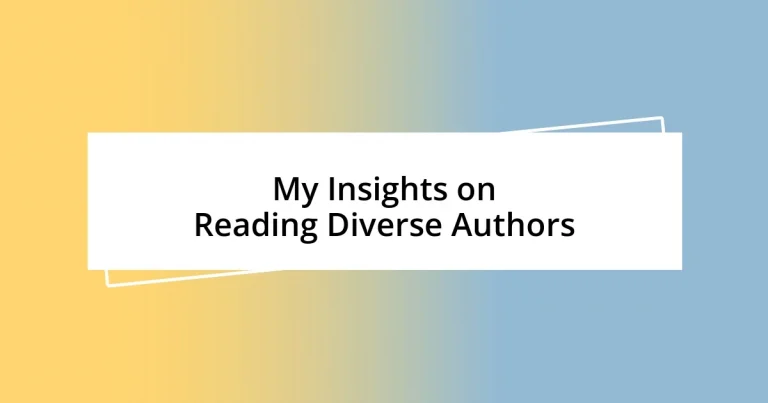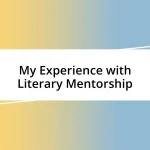Key takeaways:
- Diversity in literature broadens perspectives, enhances empathy, and challenges preconceived notions, fostering personal growth.
- Engaging with diverse authors encourages critical thinking about social issues, cultural appreciation, and discovery of new genres.
- Participating in literary communities and discussions enriches the reading experience, deepening understanding and appreciation of diverse voices.
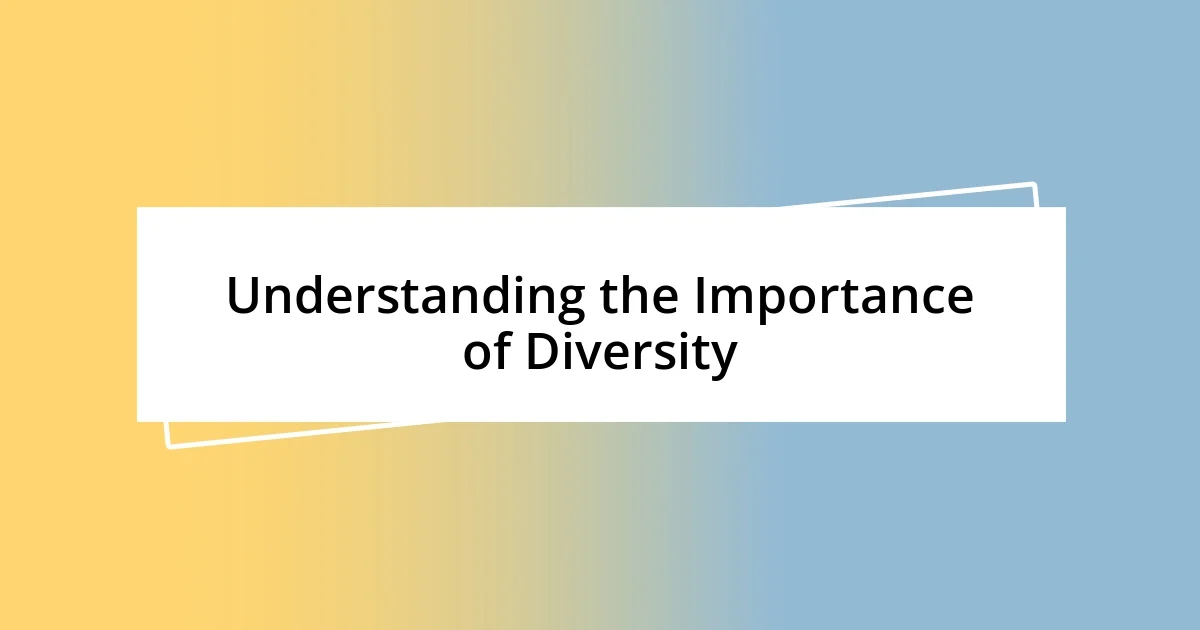
Understanding the Importance of Diversity
Diversity is a crucial lens through which we can view the world. When I pick up a book by a diverse author, I often find myself transported to experiences that differ from my own. This exposure not only broadens my perspective but also challenges my preconceived notions—something I believe is essential for personal growth.
Reflecting on my journey, I remember reading a novel by an author from a culture vastly different from mine. The narrative painted vivid images of their traditions and struggles, which made me wonder: how often do we confine our understanding of the world to our own experiences? It’s in those moments that literature becomes a bridge, connecting me to stories that might have otherwise remained unheard.
Incorporating diverse voices into our reading habits enriches not just our knowledge but also our empathy. These stories invite us into lives filled with unique challenges and triumphs, prompting us to ask ourselves how they relate to our own lives. Isn’t it fascinating how a single book can initiate conversations about identity, belonging, and shared humanity? Embracing diversity in literature allows us to better understand not just others, but also ourselves.
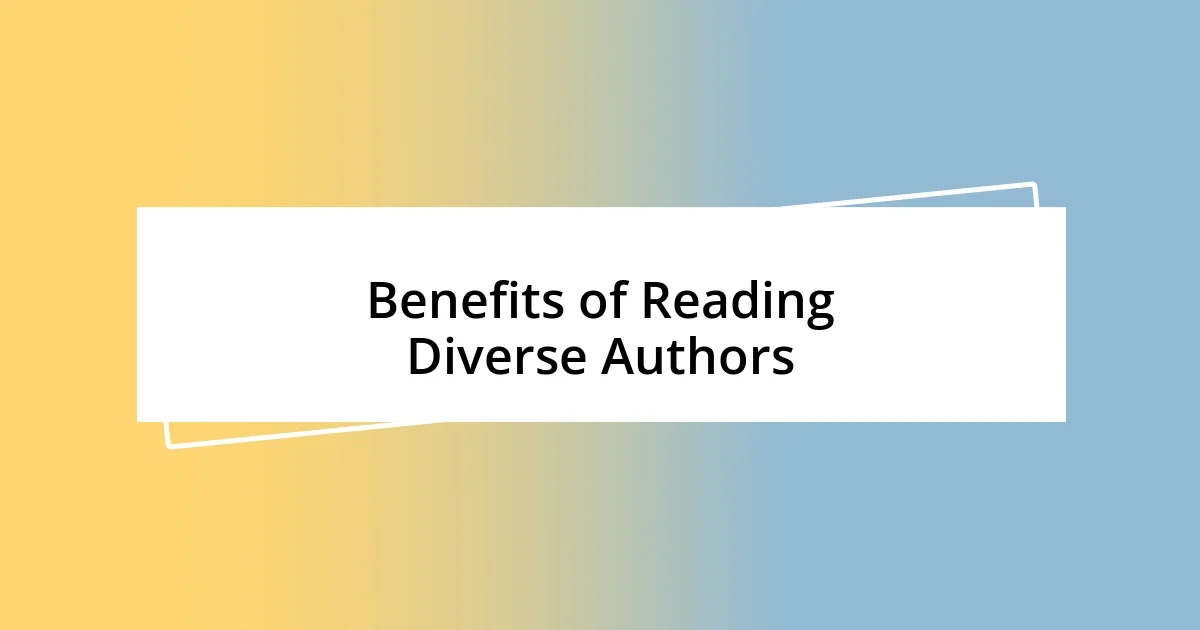
Benefits of Reading Diverse Authors
Reading diverse authors offers a treasure trove of benefits that extend beyond mere entertainment. Personally, I’ve found that engaging with different voices deepens my understanding of complex social issues. For instance, after reading a memoir by an Indigenous author, I felt a powerful shift in my awareness regarding history and current events that affect their communities. This awareness ignited a desire to seek out more diverse narratives, bridging the gap between my experience and theirs.
Here are some key benefits of reading diverse authors:
- Enhanced Empathy: Stories from varied cultural backgrounds foster empathy. They prompt me to step into someone else’s shoes, seeing the world through their eyes.
- Broader Perspectives: By exposing myself to different viewpoints, I challenge my assumptions, which is often uncomfortable but ultimately rewarding.
- Cultural Appreciation: I gain a richer appreciation for the nuances and complexities of different cultures, which cultivates respect and understanding.
- Encouragement of Critical Thinking: Diverse narratives often address contemporary issues in unique ways, urging me to think critically about social justice, identity, and more.
- Discovery of New Genres and Styles: Reading broadly introduces me to new writing styles and genres that I may not have encountered otherwise, expanding my literary palate.
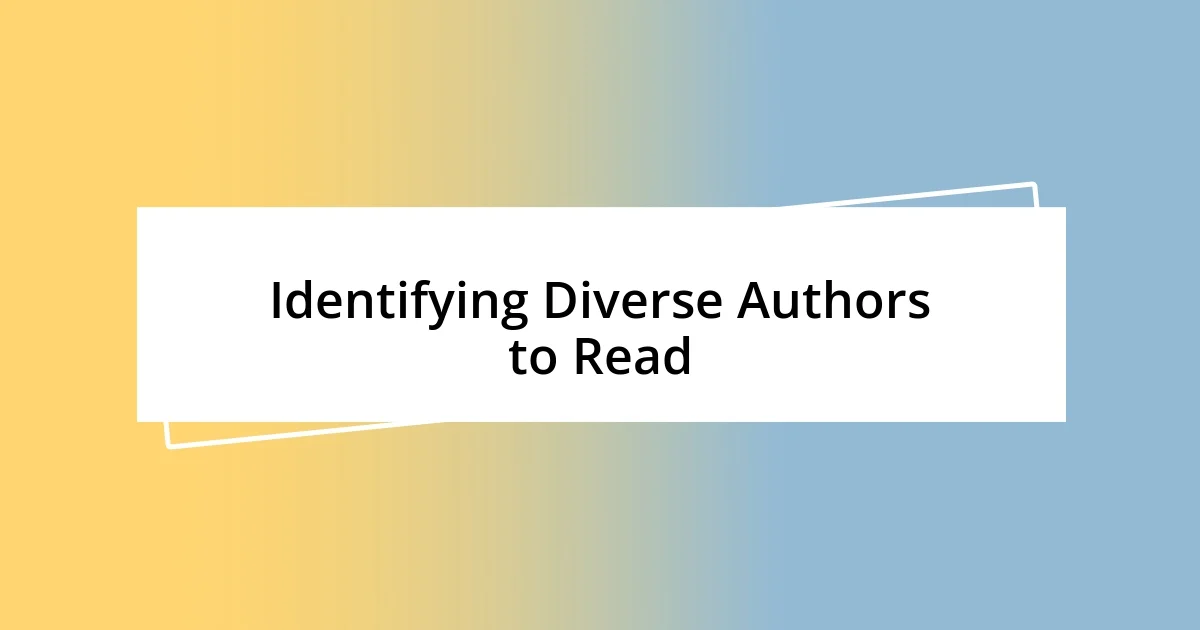
Identifying Diverse Authors to Read
Identifying diverse authors can feel like a rewarding treasure hunt. I often start by exploring online platforms and literary communities that highlight diverse voices. For example, Goodreads has lists specifically dedicated to authors of color, LGBTQ+ narratives, and other underrepresented groups. Finding these lists not only helps me discover new books but also introduces me to perspectives I may have never considered before. Have you ever found an author that resonated with you in an unexpected way? I certainly have, and those moments are truly special.
Another approach I find effective is following book bloggers and influencers who focus on diverse literature. They often share personal experiences and recommendations that resonate deeply. I recall stumbling upon a blog where the writer shared their transformative experience with a Latinx author—it’s like they opened a door for me to a whole new world of stories. Engaging with such content makes the process of finding diverse authors feel vibrant and alive.
Lastly, attending local literary events or author readings is an excellent way to discover diverse talent firsthand. There’s something about hearing an author speak about their work that adds layers of meaning to their stories. I vividly remember attending a poetry reading featuring a Black poet whose words echoed my own inner thoughts and experiences. These events allow me to connect personally with the authors and their journeys, creating a deeper appreciation for their work.
| Method | Benefits |
|---|---|
| Online Lists | Helps discover new authors and genres. |
| Book Bloggers | Provides personal insights and relatable recommendations. |
| Literary Events | Connects you with authors and deepens understanding of their narratives. |
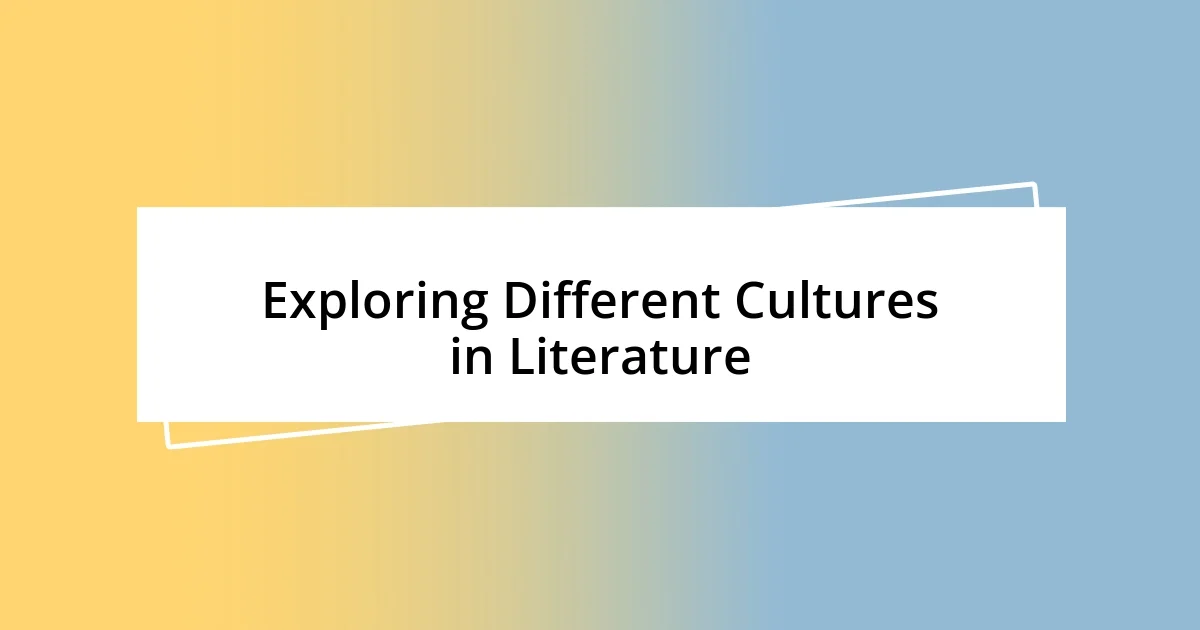
Exploring Different Cultures in Literature
Exploring different cultures through literature has transformed my perspective in ways I never anticipated. I vividly remember reading a work by a Nigerian author that intricately wove the realities of family dynamics within a culturally rich tapestry. It made me reflect on how universal themes of love, loss, and resilience are expressed differently across cultures, opening my eyes to the vast richness of human experience.
One of the most striking aspects of reading diverse authors is the way it unearths the intricacies of cultural identity. When I delved into a collection of short stories by an Indigenous Australian writer, I encountered deeply rooted traditions and beliefs that differed drastically from my own upbringing. This exposure prompted me to ponder: how often do we truly engage with perspectives that challenge our worldview? It’s a question that lingers in my mind, awakening a desire to continuously seek out and embrace these narratives.
I also find that literature acts as a bridge to understanding cultural struggles and triumphs. There was a moment after I read a memoir by a queer Arab author when I felt a powerful connection—not just to their specific experience, but to the universal quest for acceptance and belonging. Their words resonated with my own journey, reminding me that while our stories might differ, our shared emotions and aspirations create a beautiful tapestry of human connection. Isn’t it fascinating how literature can illuminate our similarities amidst our differences?
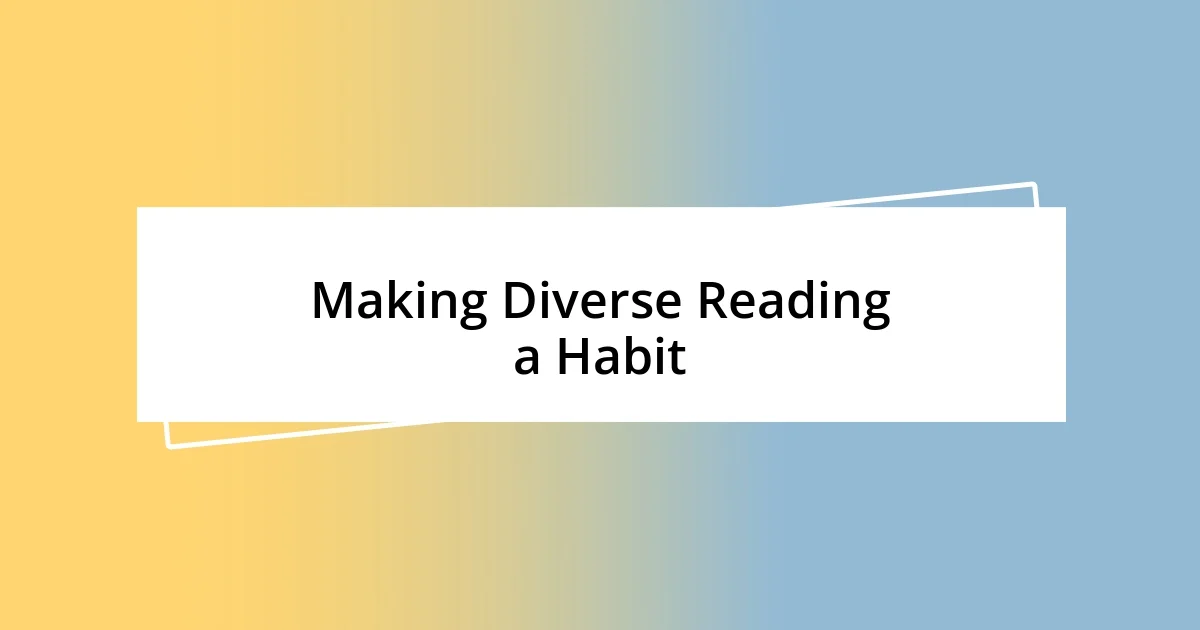
Making Diverse Reading a Habit
Developing a habit of diverse reading can be a truly enriching experience. I’ve found that setting specific goals, like reading one book from an underrepresented author each month, keeps my reading list exciting and varied. This approach not only introduces me to new narratives but also challenges my understanding of the world, transforming my perspective with each turn of the page. Have you ever noticed how one book can significantly shift your viewpoint?
I personally enjoy making a diverse reading list that includes authors from different backgrounds. I often look back at my choices and feel a rush of excitement knowing that I’m actively engaging with stories that resonate on different levels. This month, I’m excited about diving into a novel by a Middle Eastern author that promises to explore themes of migration and identity. Anticipating the journey ahead is part of what keeps me enthusiastic about my reading practices.
It’s also helpful to discuss these diverse books with friends or in book clubs. Sharing insights and opinions can lead to deeper discoveries. I remember a discussion with friends about a South Asian author who eloquently portrayed the intersection of tradition and modernity—it sparked such interesting dialogue that I left feeling inspired to read even more broadly. Isn’t it intriguing how these interactions can further enhance our understanding and appreciation of diverse literature?
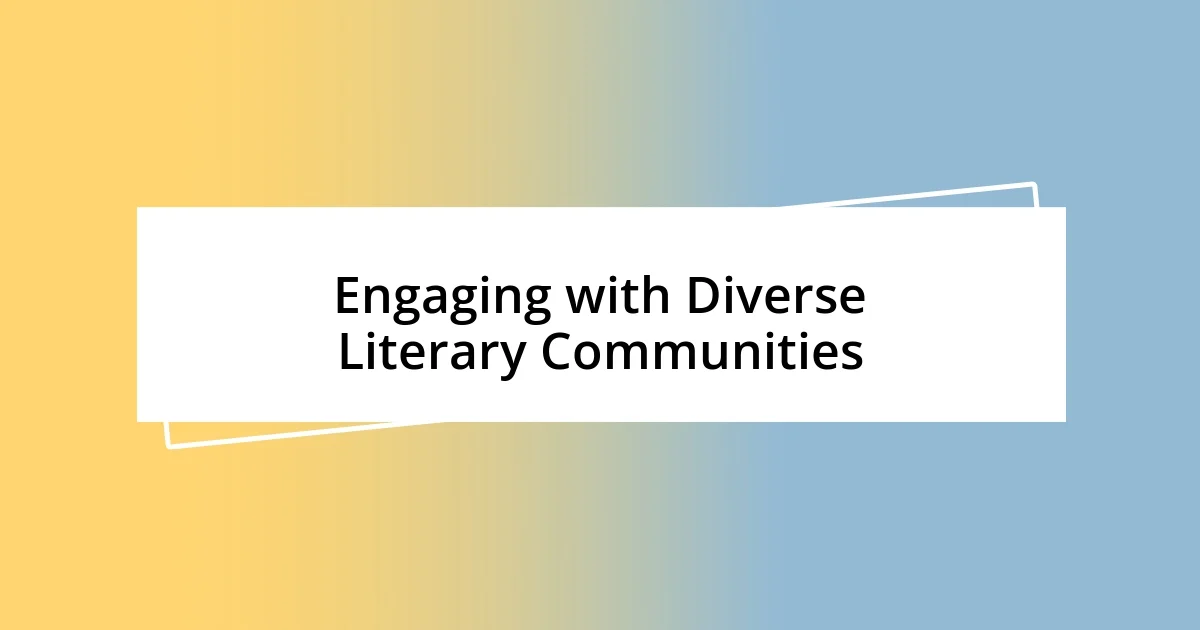
Engaging with Diverse Literary Communities
Engaging with diverse literary communities has been a pivotal part of my reading journey. I still remember attending a virtual book festival focused on Latin American authors. The energy was palpable as writers shared not just their works but also the cultural contexts behind them. It was during a panel discussion that one author spoke about the rhythm of life in her hometown, and I felt an undeniable connection—like I was being welcomed into a world so different from my own. Isn’t it amazing how a shared love for storytelling can bridge such vast divides?
Joining online forums and social media groups dedicated to diverse literature has also enriched my experience. I once stumbled upon a thread discussing the works of a Black British poet, and the insights shared by fellow readers deepened my appreciation of her wordplay and themes of resilience. Interacting with others who have different perspectives offers the chance to see familiar narratives in an entirely new light. This communal reflection often leaves me thinking, how can we all benefit from embracing the myriad voices that exist in literature?
Participating in local reading groups that focus on diverse authors has been incredibly rewarding. During one meeting, we explored a novel by a queer Asian writer, and the discussions sparked such passion. Sharing our thoughts felt like peeling back layers, revealing not just our personal experiences but also the societal norms influencing our interpretations. I walked away feeling energized and inspired, eager to seek out more diverse voices. Could it be that these community engagements not only broaden our literary horizons but also enhance our empathy toward others?












